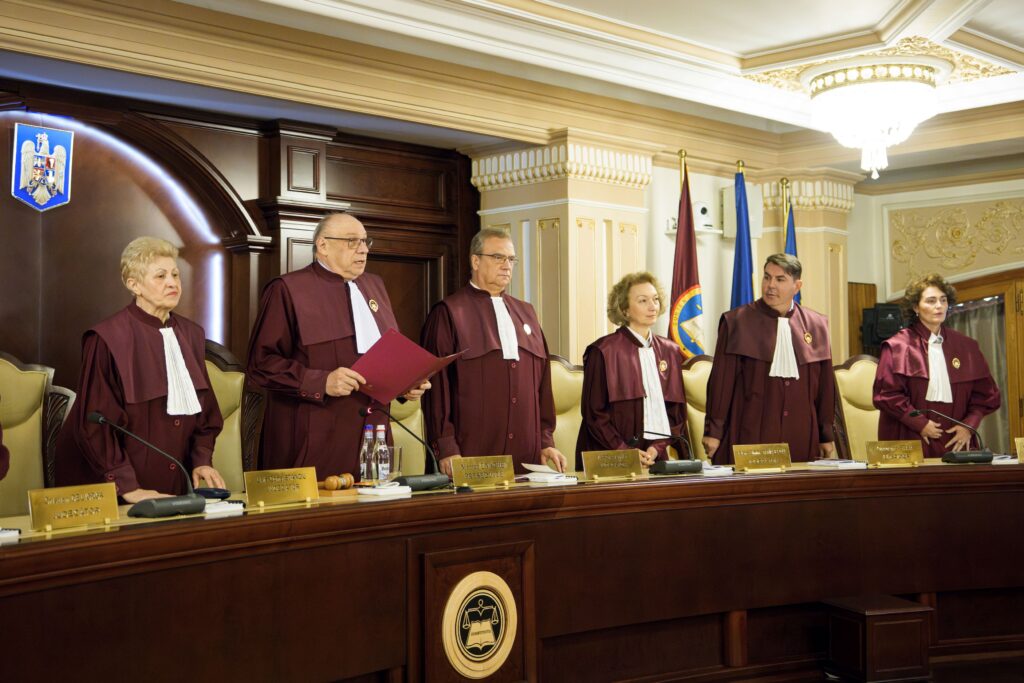Nicusor Dan, the President of Romania, appointed Dacian Cosmin Dragoș as a judge at the Constitutional Court of Romania.
Through this decision, the head of state put an end to the political control exerted by the elite of the former communist party over a key institution of the democratic system that emerged after the collapse of Nicolae Ceaușescu’s dictatorial regime.
The Constitutional Court began its activity in 1992, and over the course of 33 years of operation, the decisions of most judges have been influenced by the power circle around Ion Iliescu, formed at the end of 1989.
Whether called FSN, FDSN, PSDR, or PSD, the succession of formations that emerged following the dissolution of the single-party had a huge impact on the appointments and decisions made by the Constitutional Court.
"The President of Romania, Nicușor Dan, signed on Tuesday, July 8, 2025, the decree appointing Mr. Dacian Cosmin Dragoș, a university professor at the Faculty of Political, Administrative, and Communication Sciences and a doctoral supervisor at the Faculty of Law within Babeș-Bolyai University in Cluj-Napoca, to the position of judge at the Constitutional Court of Romania, for a nine-year term starting on July 13, 2025," as stated in the official press release from the Cotroceni Palace.
"Through this nomination, the President of Romania reaffirms the strong commitment to the proper functioning of public authorities, judicial independence, respect for the rule of law, and the strengthening of the Constitutional Court's role as a guarantor of the Constitution's supremacy," further specified in the official declaration.

Balance of Power
No one should have illusions about the Constitutional Court. As long as the appointments of judges are made by the country's president, the Senate, and the Chamber of Deputies, resulting from a double political compromise in Parliament and an act of will by the head of state, the Constitutional Court will be an expression of political trends over a decade, with judges serving 9-year terms, and will operate accordingly.
At this moment, PSD still has four judges in the Constitutional Court: Mihai Busuioc, term until 2034; Bogdan Licu, until 2031; Cristian Deliorga, 2028; Gheorghe Stan, 2028;
The last two were proposed by Liviu Dragnea, the controversial social-democratic leader, who was tried and imprisoned for corruption.
With the appointment made by President Nicușor Dan, the Constitutional Court is inclined to become more liberal and oriented towards defending the democratic system than it has been until now. This does not mean that political pressures will disappear, and judges will no longer consider the political affiliations that brought them there.

Simina Tănăsescu (2028), Mihaela Ciochină (2031), Iuliana Scântei (2031), and Dacian Cosmin Dragoș (2034) were appointed by presidents with center-right, pro-European political orientations (Iohannis and Dan) and from the PNL.
These four judges, with education, expertise, and solid practice in the legal field, have rather liberal visions, with various nuances, frequently expressing themselves as defenders of democracy and the Constitution.
It may seem trivial, but in the current context, with a worrying increase in support for extremist parties, the Constitutional Court will be called upon to play a new role as a defender of the democratic system.
UDMR Arbitrates
The liberal majority of the Constitutional Court is achieved with the help of Csaba Asztalos (2034), proposed by UDMR and supported by the coalition of pro-European formations in the Chamber of Deputies.
Asztalos replaces Attila Varga, who reached the end of his term, a much more conservative figure who tended to support the positions of Constitutional Court members associated with the social democrats.
The new Hungarian judge is perceived as an extremely balanced person, who has faced many challenges from the position of President of the National Council for Combating Discrimination, a role he has held for over a decade.
The difference between the nomination made by the President of Romania, "a recognized figure in administrative and European law, recipient of the prestigious Marie Curie European scholarship at Michigan State University (2005-2006), and a World Bank expert in public procurement (2020-2023)", referring to Dacian Cosmin Dragoș, cannot be overlooked, compared to that of Mihai Busuioc, a mediocre jurist, promoted by Liviu Dragnea to lead the Court of Auditors, suspected of intentionally reducing the institution's powers to avoid monitoring how the funds from the PNRR are spent.
Turning Point
On December 6, 2024, the Constitutional Court made the decision unanimously to annul the first round of the presidential elections, despite initially validating it, stating that declassified documents from CSAT show the existence of a campaign to influence the electoral process in Romania and the use of digital techniques to manipulate the electorate in favor of candidate Călin Georgescu.

It was the most controversial decision made by the Constitutional Court in its tumultuous 33-year history. The annulment of the presidential elections represents a turning point in the evolution of democracy in our country, a dark episode that has not been explained to the public, surrounded by mystery and controversy.
The nine judges will soon be called upon to address the complex issue of special pensions, one of the greatest dissatisfactions expressed by the public opinion, as well as regarding the rapid retirement from the judiciary, army, police, decisions that endanger the functioning of the state and cause tensions and social imbalances.
In three years, before the parliamentary elections take place, three more constitutional judge mandates will expire. These are Simina Tănăsescu, appointed by Klaus Iohannis; Cristian Deliorga (PSD), appointed by the Senate; Gheorghe Stan (PSD), the Chamber of Deputies;
If Nicușor Dan and the current majority manage to hold on until 2028, they will further change the political power balance in the Constitutional Court.
Two judges appointed by the social democrats will end their terms, who will be replaced, at best, by one coming from the PSD and one from the liberal or USR, if the current coalition holds, in addition to a second nomination made by the current president.
Even if the majority configuration in parliament changes, PSD will lose a judge in three years, and the Constitutional Court will have, at least until 2031, a liberal texture, with significant consequences for the democratic system in Romania.

